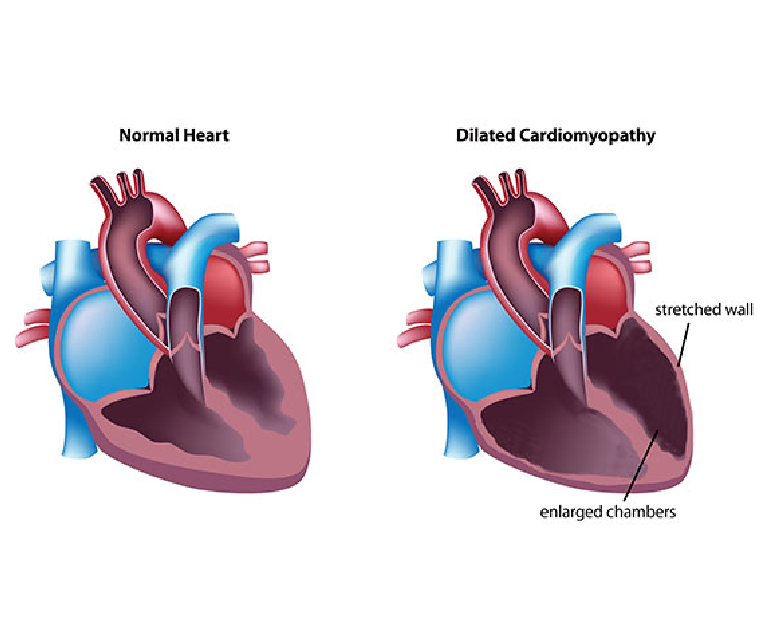Dilated cardiomyopathy (DCM) is a condition characterized by the dilation and weakening of the heart’s main pumping chamber, the left ventricle. This chronic and progressive disorder affects the heart muscle, leading to impaired cardiac function and potentially causing heart failure. DCM can also affect the right ventricle and both ventricles in some cases.
Causes
The exact causes of DCM are often unknown, but various factors can contribute to its development. These include genetic mutations, viral infections (such as viral myocarditis), exposure to toxins (for example alcohol), autoimmune diseases, and metabolic disorders. In many cases, DCM is considered idiopathic, meaning the cause is uncertain.
Symptoms
DCM can present with a range of symptoms, which may include fatigue, shortness of breath, swelling of the legs and ankles (edema), rapid or irregular heartbeat (arrhythmias), chest pain, dizziness, and fainting. These symptoms are often related to the heart’s inability to effectively pump blood and supply oxygen to the body’s tissues.
Diagnosis
To diagnose DCM, a comprehensive evaluation is required, which typically involves a thorough medical history review, physical examination, and various diagnostic tests. These tests may include electrocardiogram (ECG), echocardiogram (to assess heart structure and function), cardiac MRI or CT scan (for detailed imaging), blood tests (to rule out other conditions), and occasionally a heart biopsy.
Treatment
The management of DCM aims to improve symptoms, slow disease progression, and prevent complications. Treatment approaches may include:
- Medications: Several medications can be prescribed to manage symptoms, reduce the workload on the heart, control blood pressure, prevent blood clots, and treat arrhythmias. These may include beta-blockers, ACE inhibitors, diuretics, anticoagulants, and anti-arrhythmic drugs.
- Lifestyle modifications: Patients need to make lifestyle changes like reducing salt intake, avoiding alcohol, stopping smoking, maintaining proper weight, and exercising as required.
- Device therapy: In advanced cases or those with severe heart failure, implantable devices like pacemakers or defibrillators may be recommended to regulate the heart’s rhythm or deliver electrical shocks if life-threatening arrhythmias occur.
- Cardiac rehabilitation: This supervised program combines exercise, education, and counseling to help patients recover and improve their overall cardiovascular health.
- Surgical interventions: In some cases, surgical interventions may be necessary, such as coronary artery bypass grafting (CABG) to improve blood flow to the heart, or heart transplantation for end-stage heart failure.
Prognosis
The prognosis for individuals with DCM can vary widely depending on the underlying cause, severity of symptoms, and response to treatment. With appropriate management, lifestyle modifications, and adherence to medication, many patients can experience an improved quality of life and a slower disease progression. However, some individuals may develop more severe heart failure and require advanced therapies or heart transplantation. Regular follow-up with a cardiologist is essential to monitor the condition and adjust treatment as needed.
Conclusion
Dilated cardiomyopathy is a complex heart condition characterized by the enlargement and weakening of the heart muscle. While the exact causes are unclear in many cases, a combination of genetic, viral, autoimmune, and environmental factors can contribute to its development. Early diagnosis, appropriate medical management, lifestyle modifications, and sometimes surgical interventions are essential for managing the symptoms, slowing disease progression, and improving the prognosis for individuals with DCM.

